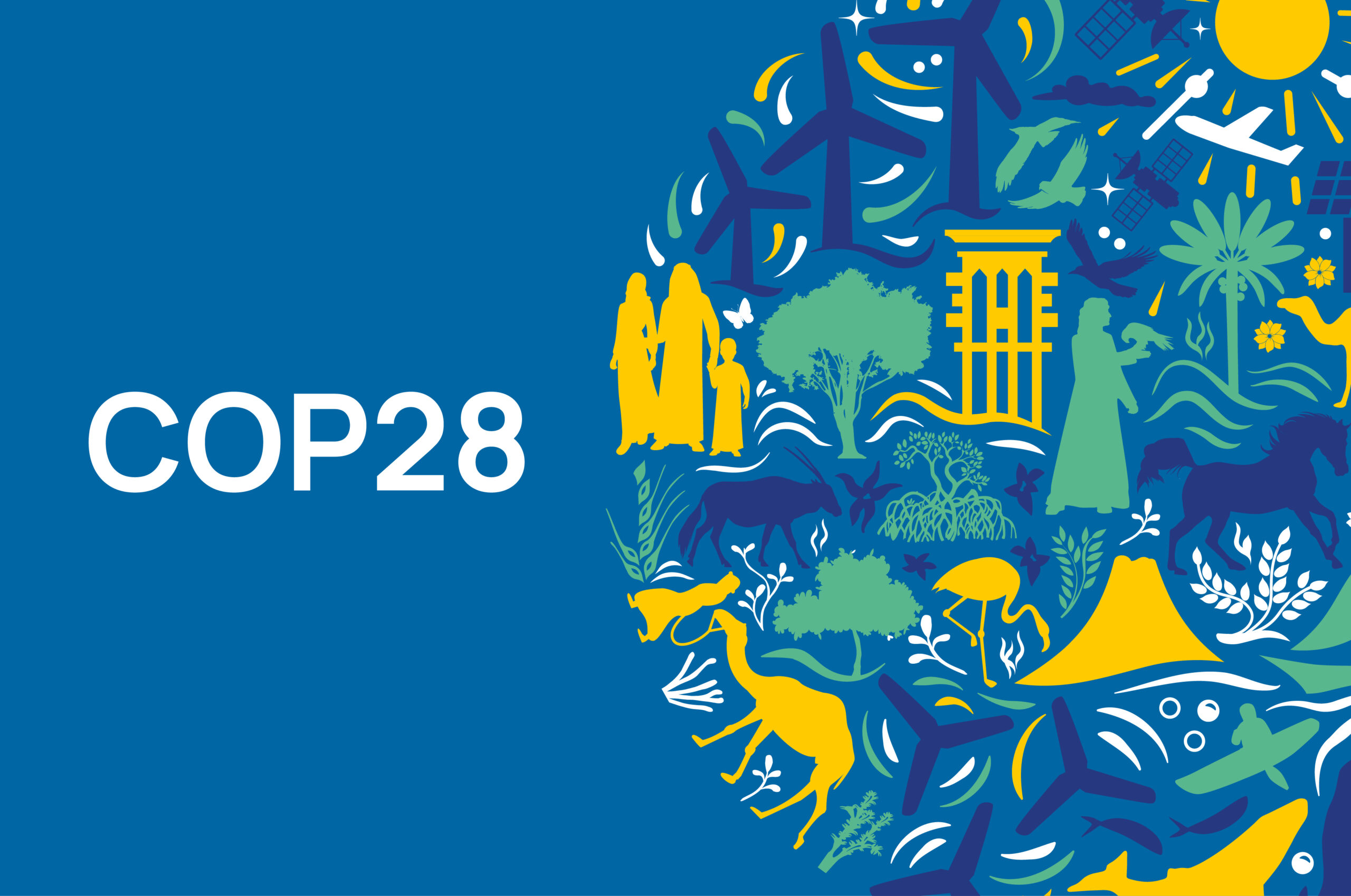In the bustling city of Dubai, from November 30th to December 12th, 2023, the world witnessed a pivotal moment in climate action history – the 28th meeting of the Conference of the Parties (COP28) to the UN Framework Convention on Climate Change (UNFCCC).
More than 70,000 delegates, including global leaders, scientists, the private sector, and activists, gathered to chart a course for our planet’s future, emphasizing the urgent need to address the climate crisis. Let’s delve into some of the key moments and discussions that defined COP28.
Renewable Energy and Fossil Fuel Phase-Out: Stepping Up the Game
A landmark achievement at COP28 was the collective vow by over 118 nations to amplify their renewable energy output, aiming to triple it, and phase out the use of fossil fuels. This commitment reflects a global urgency to pivot towards sustainable energy solutions.
Moreover, Colombia’s bold step to join an international treaty aiming to cease fossil fuel usage underlined the summit’s determination to reduce dependence on non-renewable energy sources. These actions collectively represent a fundamental shift in how the world views energy production and consumption.
The Waste Management Paradigm: A New Frontier in Climate Strategy
For the first time, COP28 spotlighted waste management as a critical element in reducing greenhouse gas (GHG) emissions. Despite contributing to total anthropogenic emissions, the waste sector holds immense potential in transitioning from a GHG emitter to a significant saver of emissions.
The International Solid Waste Association (ISWA) led this narrative through the Waste and Resource Pavilion, fostering dialogues on circular economy and decarbonized waste management.
‘Waste to Zero’ Initiative: Spearheading a Circular Economy
In a historic move, the UAE Ministry of Climate Change and Environment (MOCCAE) and Tadweer, Abu Dhabi Waste Management Company), launched the ‘Waste to Zero’ initiative, establishing a circular economy platform, further solidifying the UAE’s commitment to sustainability.
Chaired by Her Excellency Mariam bint Mohammed Almheiri, this global initiative aims to revolutionize waste management by promoting circular economy practices. It emphasizes waste minimization and waste-to-energy infrastructure, aligning with the Paris Agreement’s ambitious goals.
COP28 also hosted the first ever Waste and Resources Pavilion in the Blue Zone. The initiative was managed by the International Solid Waste Association (ISWA) in collaboration with its members, including UBQ Materials.
Groundbreaking Methane Emission Tracking: The Waste MAP
COP28 also saw the introduction of the Waste Methane Assessment Platform (Waste MAP), a pioneering global tool using satellite monitoring to track methane emissions from waste.
This platform, a collaboration of several leading environmental organizations, is a game-changer in local and global efforts to mitigate methane emissions from landfills, significantly contributing to public health and safety.
Within the ambit of COP28’s landmark initiatives, the unveiling of the Waste Methane Assessment Platform (Waste MAP) aligns seamlessly with the spirited momentum of the Global Methane Pledge. This year’s conference spotlighted an unprecedented global commitment to slash methane emissions, gathering support through over $1 billion in new grant funding and welcoming pivotal actions across nations.
The Waste MAP, as a pioneering tool, stands at the forefront of this endeavour, leveraging cutting-edge satellite monitoring to pinpoint and mitigate methane emissions from waste sources. This strategic convergence of technological innovation and global cooperation underlines a resolute step forward in our collective quest to confront one of the most pressing challenges of our climate crisis.
Food and Agriculture: A Vital Component of Climate Action
Breaking new ground, COP28 dedicated an entire day to discussions around food and agriculture, underscoring their integral role in climate action. The Food and Agriculture Organization (FAO) unveiled a comprehensive roadmap targeting a 25% reduction in methane emissions from livestock and halving food waste emissions by 2030.
This initiative highlights the necessity of diversifying global crop cultivation and investing in sustainable agricultural practices.
Coincidentally, in October 2023, the U.S. Environmental Protection Agency (EPA) released a new report qualifying methane emissions from landfilled food waste, highlighting the importance of keeping food out of landfills, and confirming that “waste food is a major environmental, socia,l and economic challenge.”
The Circularity Task Force: Paving the Way for Sustainable Business Practices
The Sustainable Markets Initiative’s Circularity Task Force, coordinated by Gemini Corporation, emerged as a pivotal force at COP28.
This task force aims to guide organizations in embedding circularity into their operations. By sharing best practices and strategies, it seeks to accelerate the transition to a circular economy, involving key players like First Abu Dhabi Bank, Dubai Airports, and LGT Group.
In tandem with the efforts of the Sustainable Markets Initiative’s Circularity Task Force, the International Solid Waste Association (ISWA) brought its profound expertise to COP28, emphasizing the critical role of waste management in achieving a circular economy.
ISWA’s first-ever Waste and Resources Pavilion at COP28 served as a hub for sharing pioneering strategies and solutions, underlining the necessity of integrating advanced waste management practices into circular business models. This collaboration echoes the task force’s mission, highlighting the synergy between waste management and circularity as foundational to driving sustainable transformations across industries.
At COP28, the confluence of strategies for reducing GHG emissions, the operationalization of Article 6, and the push towards green buildings illuminated a pathway for sustainable development. The commitment to decarbonize, spotlighted through pledges for net-zero operations and significant methane reduction by key industry players, underlines the global determination to confront climate change head-on.
The integration of energy efficiency and renewable energy initiatives, championed by programs such as the U.S. EPA’s ENERGY STAR and the Green Power Partnership, further reinforces the shift towards a sustainable economic framework. With the advocacy for green buildings and the operationalization of the Loss and Damage Fund, COP28 crafted a narrative of resilience, innovation, and collective action, marking a pivotal chapter in our global journey towards a sustainable, low-carbon future.
Looking Ahead: The Journey Continues
COP28 has undoubtedly set a new trajectory in our fight against climate change. The summit’s focus on waste management and sustainable practices marks a significant step in our collective journey towards a sustainable and equitable future.
As we reflect on the outcomes of COP28, it’s evident that our path to a better, balanced world is a collaborative journey requiring the commitment of every individual and organization. The summit’s resolutions and commitments are a clarion call to action – an invitation to join hands in shaping a sustainable future for our planet.
Engage with UBQ Materials for More Insights
For those intrigued by the intersection of sustainability and innovation, the UBQ Materials blog offers a treasure trove of insights and stories.
Dive into discussions on waste management, circular economy, and the latest in sustainability practices. Join us in exploring how each step, no matter how small, contributes to a larger impact in our shared quest for a sustainable world.
COP28 Climate Summit: FAQs
Where was COP28 held?
COP28 was held in Dubai, United Arab Emirates.
When did COP28 take place?
The summit took place from November 30th to December 12th, 2023.
How many people attended COP28?
Over 70,000 delegates attended COP28, including member states of the UNFCCC, business leaders, climate scientists, Indigenous Peoples, journalists, and other stakeholders.
What is COP28?
COP28 refers to the 28th meeting of the Conference of the Parties to the UN Framework Convention on Climate Change (UNFCCC), a global forum for addressing climate change.
Why is COP28 significant?
COP28 is significant as it represents a global effort to tackle climate change, with nations coming together to agree on ways to limit global temperature rise, adapt to climate change effects, and aim for net-zero emissions by 2050.
Who participated in COP28?
Participants included member states of the UNFCCC, business leaders, climate scientists, journalists, and various experts and stakeholders.
At COP28, the business sector also played a pivotal role, showcasing the increasing importance of public-private partnerships and the private sector’s contributions to climate action efforts. The conference saw a record number of attendees, with over 70,000 participants, including a significant presence of business leaders from various sectors such as energy, finance, and technology.
This mix underscored the event’s evolution towards a more inclusive approach to addressing climate challenges, integrating the innovation, resources, and strategic capabilities of the private sector alongside governmental and non-governmental efforts.
What topics were discussed at COP28?
At COP28, the world’s leaders, visionaries, and environmental stewards convened in a momentous gathering that charted a bold course for climate action. The discussions were rich and varied, spanning from the critical acceleration of renewable energy adoption, the strategic phase-out of fossil fuels, to the pioneering establishment of a Loss and Damage Fund.
This conference was a clarion call to action, emphasizing not just the urgent need for energy transition but also the importance of methane reduction, the drive towards net-zero by the private sector, and the crucial integration of climate objectives with financial strategies, all aimed at safeguarding our planet for future generations.
Was there any focus on economic and energy transition challenges at COP28?
Yes, the summit focused on the economic challenges of transitioning from fossil fuels, particularly for countries dependent on coal and oil exports, and discussed developing alternative economic sectors and managing financial system impacts.
Which country will be hosting COP29?
The 2024 UN Climate Change Conference (UNFCCC COP 29) will be hosted in Baku, Abseron, Azerbaijan, November 11 – 24, 2024.


